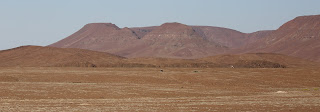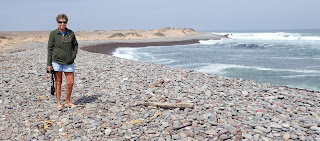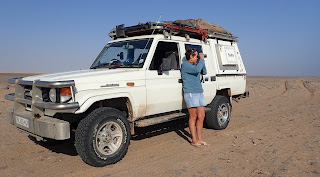Looking down from the Grooteberg Pass, towards
the Skeleton Coast.
The entrance gate to the national park.
We were once again away early & on the open road on 25th August, at first
re-tracing our route a little & going back over the Grooteberg Pass until
we hit the turn off to Terrace Bay. It
was a scenic drive & we entered the Skeleton Coast National Park (which I
had wanted to visit for some time).
It then became an increasingly arid landscape & we stopped at Torra Bay to look around, finding both White breasted & Cape Cormorants, a whale skeleton & spoor of Brown Hyena. However on walking back to the vehicle we noticed we had another flat! It was a bit of a mission to change the tyre as an important piece had fell off the high lift jack, so we had to use the ordinary one, which necessitated placing it high on bricks to get the required lift.
After two hours we were back on the road again & arrived at our
accommodation at Terrace Bay. We
stayed in a room with great views of the ocean & then enjoyed a terrific
meal in the restaurant.
It is a big landscape here,
Whale Skeleton at Torra Bay.
White breasted & Cape Cormorants
White breasted Cormorant
Cape Cormorants with two White breasted.
Cape Cormorants
Nesting sites are in short supply here,
so any man-made structure will be suitable.
Displaying.
Brown Hyena spoor.
Oh dear! Yet another one!
It then became an increasingly arid landscape & we stopped at Torra Bay to look around, finding both White breasted & Cape Cormorants, a whale skeleton & spoor of Brown Hyena. However on walking back to the vehicle we noticed we had another flat! It was a bit of a mission to change the tyre as an important piece had fell off the high lift jack, so we had to use the ordinary one, which necessitated placing it high on bricks to get the required lift.
Terrace Bay in the far distance.
Terrace Bay: our home for the next three nights.
Looking towards the Atlantic Ocean.
Looking inland over the dunes.
In common with many remote areas,
nothing gets taken away!
Tractrac Chat
Red capped Lark
Pied Crow
In common with many remote areas,
nothing gets taken away!
Tractrac Chat
Red capped Lark
Pied Crow
This small wetland area held a few migrant waders.
Not all areas are totally barren.
Black backed Jackal
Not all areas are totally barren.
Black backed Jackal
On 26th we were up
early on the hunt for the fabled Desert
Lions. We drove south along the main road searching every patch of
vegetated landscape. We went 36kms south to the Uniab River area. It was an interesting drive but we didn’t see the Lions.
We did however see three lots of Lion spoor, which proves that they actually do
exist! We returned by taking a 4x4 track close to the shore which gave some
scenic views, Black backed Jackal & a few birds. Back in camp we saw both Tractrac Chat & Red capped Lark. tried a little bit of sea-watching but without much joy, seeing just common species + White chinned Petrel & Sooty Shearwater.
Late afternoon we drove the very scenic Dune Drive close to Terrace Bay. & then enjoyed an excellent meal in the restaurant again. The begging Black backed Jackal paid us a visit & peered through the window hoping for scraps!
The 27th saw us up before first light & after breakfast we drove south again, this time taking the rough coastal track next to the sea. It started out cold & overcast, the wind gradually increased in strength, so getting out of the car became a struggle. We didn't see much, just the same species as yesterday. We had nice views of a group of 10 Gemsbok a lone Springbok & Black backed Jackal, but that was it! We returned back to our accommodation around mid-day, tried a little more sea-watching & then packed away in readiness for our very early start the next day.
Birds:
Ostrich 4; Cape Cormorant 1,500+; White breasted Cormorant 20; White chinned Petrel 6; Giant Petrel sp 1; Sooty Shearwater 1; Cape Gannet 25; Kelp Gull 70; Egyptian Goose 2; Cape Teal 2; Helmeted Guinefowl 4; Wood Sandpiper 1; Curlew Sandpiper 20; Little Stint 5; Ruddy Turnstone 1; White fronted Plover 2; Red capped Lark 2; Grey's Lark 3; Cape Wagtail 1; Pied Crow 8; Black Crow 2; TracTrac Chat 4; Southern Masked Weaver 1 & Common Waxbill 5.
Mammals:
Gemsbok 14; Springbok 12; Black backed Jackal 6.
The Skeleton Coast National Park is an interesting place to visit & we both really enjoyed our time here. However, many of the tracks leading to interesting habitats are closed to tourists, which means you are largely confined to the main road & a couple of off-road tracks. Very frustrating!
Gemsbok
Of course, not all make it in life.
Black backed Jackal
They seem to do well in this environment.
They pair for life & are often seen together.
The 27th saw us up before first light & after breakfast we drove south again, this time taking the rough coastal track next to the sea. It started out cold & overcast, the wind gradually increased in strength, so getting out of the car became a struggle. We didn't see much, just the same species as yesterday. We had nice views of a group of 10 Gemsbok a lone Springbok & Black backed Jackal, but that was it! We returned back to our accommodation around mid-day, tried a little more sea-watching & then packed away in readiness for our very early start the next day.
Birds:
Ostrich 4; Cape Cormorant 1,500+; White breasted Cormorant 20; White chinned Petrel 6; Giant Petrel sp 1; Sooty Shearwater 1; Cape Gannet 25; Kelp Gull 70; Egyptian Goose 2; Cape Teal 2; Helmeted Guinefowl 4; Wood Sandpiper 1; Curlew Sandpiper 20; Little Stint 5; Ruddy Turnstone 1; White fronted Plover 2; Red capped Lark 2; Grey's Lark 3; Cape Wagtail 1; Pied Crow 8; Black Crow 2; TracTrac Chat 4; Southern Masked Weaver 1 & Common Waxbill 5.
Mammals:
Gemsbok 14; Springbok 12; Black backed Jackal 6.
The Skeleton Coast National Park is an interesting place to visit & we both really enjoyed our time here. However, many of the tracks leading to interesting habitats are closed to tourists, which means you are largely confined to the main road & a couple of off-road tracks. Very frustrating!
















































Thanks for this article! I am a Patron for Ocean Conservation Namibia. This great group goes out several days a week and rescues Cape Fur Seals from entanglements such as commercial and recreational fishing line, gill nets, and rubbish. Thanks for these photos. :) Their most recent video showed them at Torra Bay and I have been researching it. I was very pleased to see your photos and the identifications of the local birds.
ReplyDeleteThanks again!